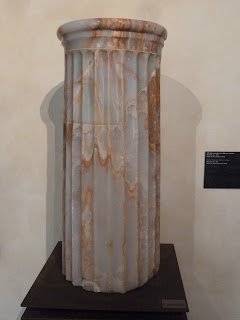So on up to the Capitoline Hill. The Museums grand steps are lined with statues of Castor and Pollux.
 |
| Of course, it was recently Christmas. |
The Museums have a square at the entrance with a statue of Marcus Aurelius (or rather a copy thereof) taking pride of place but there are some other rather colossal bits of statues outside too. From here on in there are going to be a lot of exhibits and most of them statues. They do photograph well, and they are very good, albeit one can't help but notice the slightly homoerotic overtones. The Romans, or perhaps more importantly the Greeks, of whose statues these were mostly copies, were very good at depicting naked men. Got it down to a fine art one might say.
 |
| Yes this is the original of the statue outside. Note there are still signs of gilding. Would have been very impressive. Indeed it is very impressive. |
 |
| All that is left of a colossal statue of Constantine |



There is a Renaissance art collection here too Note the number of St Sebastians. A sadly popular saint, sadly because the poor sods believed if you prayed to him you might survive the plague like he survived execution by arrows. Of course, both were myths, but I guess if you are desperate enough you will believe in anything. Or else it was just a good excuse for some sado-masochism on the church walls.

 |
| Famous Carravagio of John the Baptist, or maybe just a shepherd boy |
 |
| The most famous image of Rome, but a marriage of statues. Long known as an Etruscan statue of a wolf with Renaissance toddlers added to make it the statue of Romulus and Remus, but I think even the wolf s now thought to be medieval so not ancient at all. |
 |
| Old glass in the windows. Nice effect? |
 |
| There is underground an interesting, albeit not very photogenic, collection of grave inscriptions |
Unsurprisingly, the Capitoline Hill provides great views of the Forum

 |
| A small Egyptian collection |
 |
| Interestingly this "Fallen Warrior" is actually a Discus Thrower just rotated with new bits (shield, sword) added |
 |
| The Dying Gaul, just about the most famous Roman statue (ie copy of a Greek one) in the collection |






























































































No comments:
Post a Comment